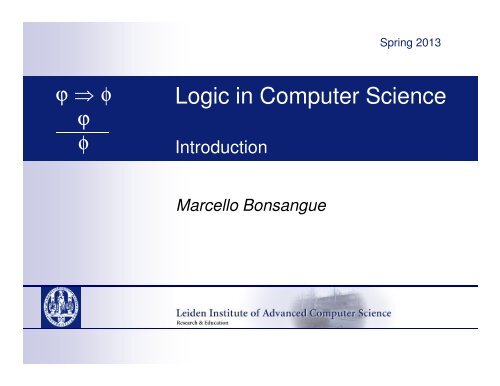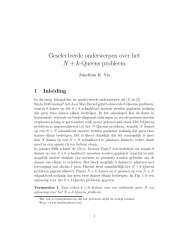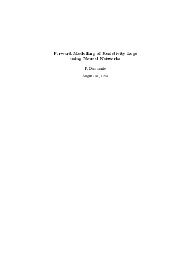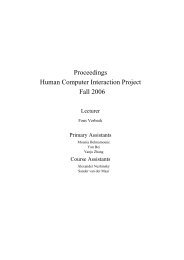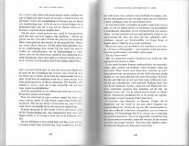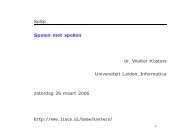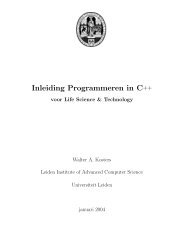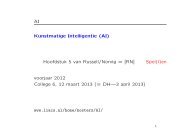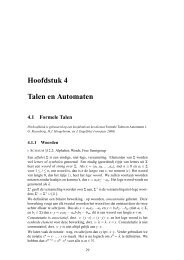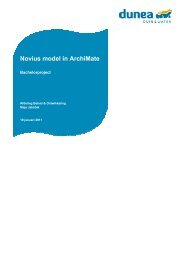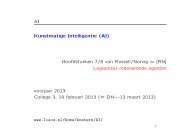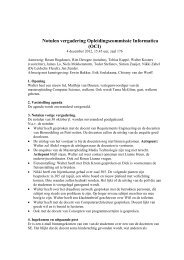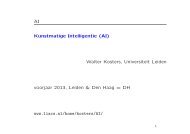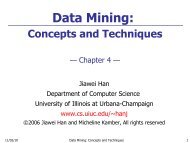Logic in Computer Science - Liacs
Logic in Computer Science - Liacs
Logic in Computer Science - Liacs
Create successful ePaper yourself
Turn your PDF publications into a flip-book with our unique Google optimized e-Paper software.
ϕ ⇒ φ<br />
ϕ<br />
φ<br />
<strong>Logic</strong> <strong>in</strong> <strong>Computer</strong> <strong>Science</strong><br />
Introduction<br />
Marcello Bonsangue<br />
Spr<strong>in</strong>g 2013
What is <strong>Logic</strong>?<br />
<strong>Logic</strong> from the Greek λογικη<br />
<strong>Logic</strong> a - Spr<strong>in</strong>g 2011<br />
Slide 2<br />
If it was so, it might be,<br />
and if it were so, it would be;<br />
but as it isn’t, it a<strong>in</strong>’t.<br />
That’s logic!<br />
Lewis Carol – via Tweedledee <strong>in</strong><br />
Through the look<strong>in</strong>g glass<br />
The tool for dist<strong>in</strong>guish<strong>in</strong>g between the true and the false (Averroes).<br />
The science of the most general laws of truth (Gottlob Frege)<br />
The study of the formal pr<strong>in</strong>ciples of reason<strong>in</strong>g (Webster dictionary)<br />
The analysis and appraisal of arguments (Wikipedia)<br />
1/22/2013<br />
2
Trivium (three ways)<br />
Preparatory study at medieval university<br />
Grammar, the art of comb<strong>in</strong><strong>in</strong>g symbols to express thought<br />
<strong>Logic</strong>, the art of th<strong>in</strong>k<strong>in</strong>g<br />
Rhetoric, the art of communicat<strong>in</strong>g thought<br />
to be studied before quadrivium<br />
Arithmetic, geometry, music, and astronomy<br />
Simpler, thus … trivial !<br />
<strong>Logic</strong> a - Spr<strong>in</strong>g 2011<br />
Slide 3<br />
1/22/2013<br />
3
The four ages of <strong>Logic</strong><br />
Symbolic logic (500 b.C. – 19 th century)<br />
Algebraic logic (mid – late 19 th century)<br />
Mathematical logic (late 19 th – mid 20 th century)<br />
<strong>Logic</strong> <strong>in</strong> computer science (late 20 th century – )<br />
<strong>Logic</strong> a - Spr<strong>in</strong>g 2011<br />
Slide 4<br />
1/22/2013<br />
4
The orig<strong>in</strong> of logic<br />
Plato: what is that can properly<br />
be called true or false?<br />
In formal debate sophists used<br />
rules to determ<strong>in</strong>es who had<br />
won an argument<br />
<strong>Logic</strong> dealt with arguments <strong>in</strong> natural language used<br />
by humans<br />
<strong>Logic</strong> a - Spr<strong>in</strong>g 2011<br />
Slide 5<br />
1/22/2013<br />
5
Ambiguities and paradoxes<br />
All or one?<br />
Eric does not believe that Mary can pass any test.<br />
Different mean<strong>in</strong>gs<br />
Students hate annoy<strong>in</strong>g professors<br />
Paradox<br />
This sentence is a lie<br />
<strong>Logic</strong> a - Spr<strong>in</strong>g 2011<br />
Slide 6<br />
1/22/2013<br />
6
Symbolic logic<br />
Aristotele’s syllogism (350 b.C.)<br />
Major premise: All men are mortal.<br />
M<strong>in</strong>or premise: Socrates is a man.<br />
Conclusion: Socrates is mortal.<br />
Bacon (17 th century)<br />
Not deduction, but <strong>in</strong>duction should be used for draw<strong>in</strong>g<br />
generalized conclusions from axioms or observations<br />
Kant (18 th century)<br />
<strong>Logic</strong> is the one completed science, and Aristotelian logic<br />
<strong>in</strong>cluded everyth<strong>in</strong>g about logic there is to know.<br />
<strong>Logic</strong> a - Spr<strong>in</strong>g 2011<br />
Slide 7<br />
1/22/2013<br />
7
The four ages of <strong>Logic</strong><br />
Symbolic logic (500 b.C. – 19 th century)<br />
Algebraic logic (mid – late 19 th century)<br />
Mathematical logic (late 19 th – mid 20 th century)<br />
<strong>Logic</strong> <strong>in</strong> computer science (late 20 th century – )<br />
<strong>Logic</strong> a - Spr<strong>in</strong>g 2011<br />
Slide 8<br />
1/22/2013<br />
8
Algebraic <strong>Logic</strong><br />
Leibniz's dream (1680): comb<strong>in</strong><strong>in</strong>g symbolic logic,<br />
mathematics and philosophy.<br />
Formulate logic us<strong>in</strong>g a mathematical language<br />
Ideas are composed from very few simple ones us<strong>in</strong>g few<br />
comb<strong>in</strong>ators like conjunction, negation, …<br />
Boole and De Morgan (end 17 th century)<br />
Study of properties of conjunction, negation … of symbols<br />
<strong>in</strong> analogy to multiplication, subtraction of numbers<br />
a(b + c) = (ab) + (ac) a∩ (b ∪ c) = (a ∩ b) ∪ (a ∩ c)<br />
<strong>Logic</strong> a - Spr<strong>in</strong>g 2011<br />
Slide 9<br />
1/22/2013<br />
9
Algebraic <strong>Logic</strong><br />
Dodgson (Lewis Carol) (1860)<br />
Venn’s diagrams as a visualization of sets<br />
Schröder's “The algebra of <strong>Logic</strong>” (1890)<br />
<strong>Logic</strong> is calculat<strong>in</strong>g discipl<strong>in</strong>e, a scientific universal<br />
language that looks more like a sign language than like a<br />
sound language.<br />
<strong>Logic</strong> become a useful tool to resolve many serious<br />
problems <strong>in</strong> mathematics<br />
<strong>Logic</strong> a - Spr<strong>in</strong>g 2011<br />
Slide 10<br />
1/22/2013<br />
10
The four ages of <strong>Logic</strong><br />
Symbolic logic (500 b.C. – 19 th century)<br />
Algebraic logic (mid – late 19 th century)<br />
Mathematical logic (late 19 th – mid 20 th century)<br />
<strong>Logic</strong> <strong>in</strong> computer science (late 20 th century – )<br />
<strong>Logic</strong> a - Spr<strong>in</strong>g 2011<br />
Slide 11<br />
1/22/2013<br />
11
Mathematical logic<br />
Mathematics become complex … and ambiguous<br />
Cauchy (1820): <strong>in</strong>f<strong>in</strong>ite sum of cont<strong>in</strong>uous function is<br />
cont<strong>in</strong>uous<br />
Abel (1826): counterexample!<br />
Frege (1879) proposes a new logic with quantifiers as<br />
a language for mathematics to resolve ambiguities<br />
more powerful than Aristotelian (propositional) logic<br />
Weierstrasse (ε,δ) def<strong>in</strong>ition of limits and cont<strong>in</strong>uity<br />
Peano axiomatization of natural numbers<br />
Hilbert axiomatization of geomtery<br />
<strong>Logic</strong> a - Spr<strong>in</strong>g 2011<br />
Slide 12<br />
1/22/2013<br />
12
The golden age<br />
Cantor set theory, <strong>in</strong>f<strong>in</strong>ity of <strong>in</strong>f<strong>in</strong>ities, transf<strong>in</strong>ite numbers<br />
Mathematics is apart from physical phenomena<br />
The absolute <strong>in</strong>f<strong>in</strong>ity nature of God is challenged<br />
Hilbert’s program (1920)<br />
F<strong>in</strong>itary logic is the language of mathematics<br />
Completeness: all true mathematical statements should be<br />
proved <strong>in</strong> this logic<br />
Consistency: no contradiction can be obta<strong>in</strong>ed <strong>in</strong> this logic<br />
Decidability: there should be an algorithm for decid<strong>in</strong>g<br />
theorems.<br />
<strong>Logic</strong> a - Spr<strong>in</strong>g 2011<br />
Slide 13<br />
1/22/2013<br />
13
The Russell paradox<br />
Cantor set theory is <strong>in</strong>consistent (1901)<br />
If T = { x | x ∉ x } then x ∈ x ⇔ x ∉ x<br />
Russel and Whitehead Pr<strong>in</strong>cipia Mathematica (1919):<br />
Solution by us<strong>in</strong>g a hierarchy of sets (type theory)<br />
Sets of a given type can conta<strong>in</strong> sets of preced<strong>in</strong>g types (those<br />
lower <strong>in</strong> the hierarchy), thus prevent<strong>in</strong>g loops.<br />
Zermelo-Fraenkel axiomatic set theory (1922)<br />
Set theory as foundation of mathematics<br />
<strong>Logic</strong> a - Spr<strong>in</strong>g 2011<br />
Slide 14<br />
1/22/2013<br />
14
Mathematics is more than sets<br />
Cont<strong>in</strong>uum Hypothesis (CH)<br />
There is no set between the Integers and the Reals<br />
Axiom of choice (AC)<br />
It is always possible to select an element from each non- nonempty<br />
set of an <strong>in</strong>f<strong>in</strong>ite collection of sets.<br />
Goedel (1930) and Cohen (1960)<br />
Assum<strong>in</strong>g or not either CH or AC does not give a<br />
contradiction <strong>in</strong> ZF set theory<br />
There are mathematical statements that are <strong>in</strong>dependent<br />
from set theory<br />
<strong>Logic</strong> a - Spr<strong>in</strong>g 2011<br />
Slide 15<br />
1/22/2013<br />
15
The end of Hilbert’s program<br />
Goedel (1931)<br />
If a logic is strong enough to form statement about itself,<br />
then it cannot be complete<br />
It is impossible to prove consistency of arithmetic with<strong>in</strong> any<br />
formal theory of arithmetic<br />
Church (1936), Tur<strong>in</strong>g (1937), Post (1946)<br />
There are problems that no algorithm<br />
could ever solve<br />
<strong>Logic</strong> is not the ultimate foundation of mathematics,<br />
simply another branch of it<br />
<strong>Logic</strong> a - Spr<strong>in</strong>g 2011<br />
Slide 16<br />
1/22/2013<br />
16
The four ages of <strong>Logic</strong><br />
Symbolic logic (500 b.C. – 19 th century)<br />
Algebraic logic (mid – late 19 th century)<br />
Mathematical logic (late 19 th – mid 20 th century)<br />
<strong>Logic</strong> <strong>in</strong> computer science (late 20 th century – )<br />
<strong>Logic</strong> a - Spr<strong>in</strong>g 2011<br />
Slide 17<br />
1/22/2013<br />
17
<strong>Computer</strong> <strong>Science</strong> started as <strong>Logic</strong><br />
Outcome of Hilbert’s program<br />
Formalization of algorithm (Church, Tur<strong>in</strong>g)<br />
Stored-program computers (Tur<strong>in</strong>g mach<strong>in</strong>e, von Neumann)<br />
Functional programm<strong>in</strong>g (Church λ-calculus)<br />
Type theory (Russell, Whitehead, Church)<br />
Recursive function theory (Goedel, Church, Tur<strong>in</strong>g, Kleene,<br />
Post)<br />
Automata theory<br />
<strong>Logic</strong> a - Spr<strong>in</strong>g 2011<br />
Slide 18<br />
1/22/2013<br />
18
<strong>Computer</strong> <strong>Science</strong> and <strong>Logic</strong><br />
<strong>Computer</strong> <strong>Science</strong> = design and study of<br />
computational systems via formal languages<br />
<strong>Logic</strong> = formal language to study properties of<br />
mathematical structures<br />
<strong>Logic</strong> is the calculus of computer science<br />
<strong>Logic</strong> has been more effective <strong>in</strong> computer science<br />
than it has been <strong>in</strong> mathematics<br />
<strong>Logic</strong> a - Spr<strong>in</strong>g 2011<br />
Slide 19<br />
1/22/2013<br />
19
<strong>Logic</strong> and system verification<br />
Model check<strong>in</strong>g<br />
Spec<br />
Model<br />
Program verification<br />
<strong>Logic</strong> a - Spr<strong>in</strong>g 2011<br />
Slide 20<br />
Spec<br />
System<br />
Model checker<br />
Yes!<br />
No<br />
Yes!<br />
No: counterexample<br />
1/22/2013<br />
20
<strong>Logic</strong> and programm<strong>in</strong>g languages<br />
Type theory<br />
Program semantics<br />
Rewrit<strong>in</strong>g systems<br />
Functional programm<strong>in</strong>g<br />
<strong>Logic</strong> and constra<strong>in</strong>t programm<strong>in</strong>g<br />
<strong>Logic</strong> a - Spr<strong>in</strong>g 2011<br />
Slide 21<br />
1/22/2013<br />
21
<strong>Logic</strong> and databases<br />
Query languages (SQL)<br />
Based on first-order logic<br />
Query evaluation<br />
Based on relational algebra<br />
XML Data Type Def<strong>in</strong>ition<br />
Based on tree automata<br />
XML queries<br />
Based on tree transducers<br />
<strong>Logic</strong> a - Spr<strong>in</strong>g 2011<br />
Slide 22<br />
1/22/2013<br />
22
<strong>Logic</strong> and ….<br />
Artificial <strong>in</strong>telligence<br />
Computational complexity<br />
Hardware circuits<br />
Security<br />
…<br />
<strong>Logic</strong> a - Spr<strong>in</strong>g 2011<br />
Slide 23<br />
1/22/2013<br />
23
<strong>Logic</strong> from computer science<br />
<strong>Logic</strong>s on f<strong>in</strong>ite structures<br />
Fixpo<strong>in</strong>t logics, modal and temporal logics<br />
Description logics, non-monotonic logic<br />
Connections between logic and automata<br />
Co<strong>in</strong>duction, coalgebra, bisimulation<br />
<strong>Logic</strong> a - Spr<strong>in</strong>g 2011<br />
Slide 24<br />
1/22/2013<br />
24
Reference<br />
Moshe Vardi A Brief History of <strong>Logic</strong>, 2003.<br />
PenC - Spr<strong>in</strong>g 2006<br />
Slide 25<br />
1/22/2013<br />
25


